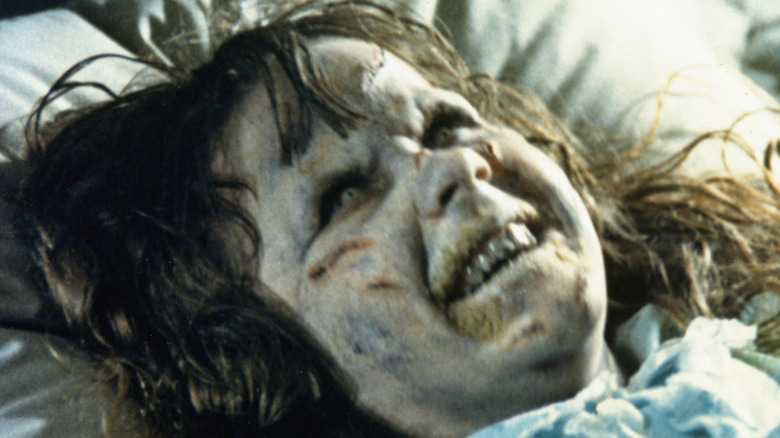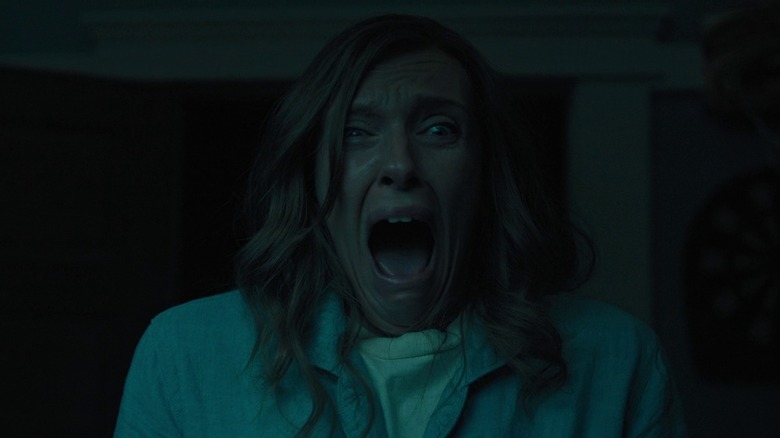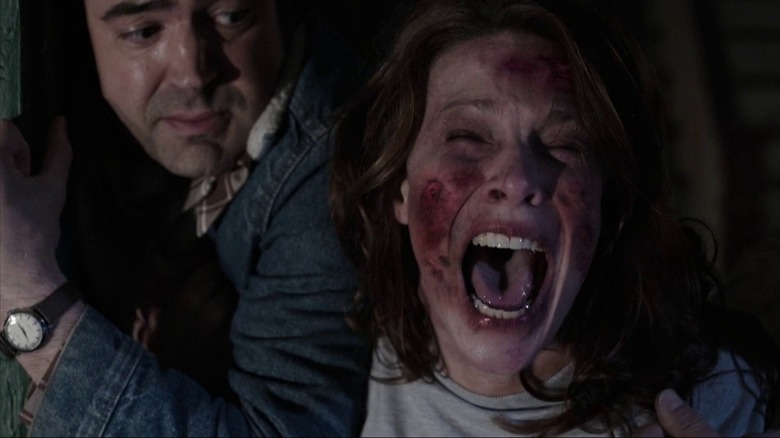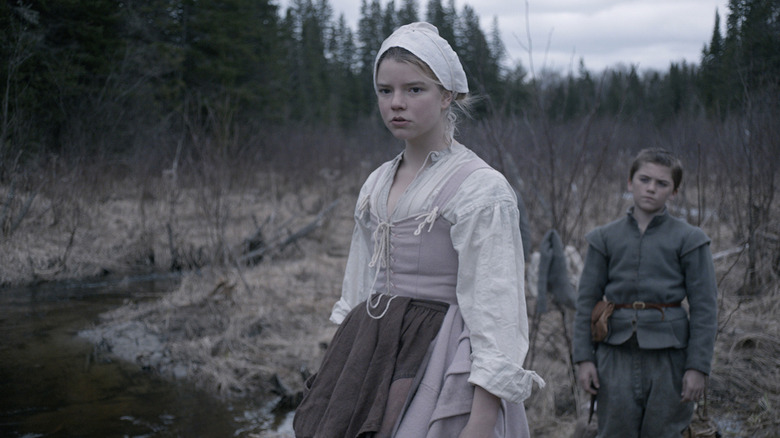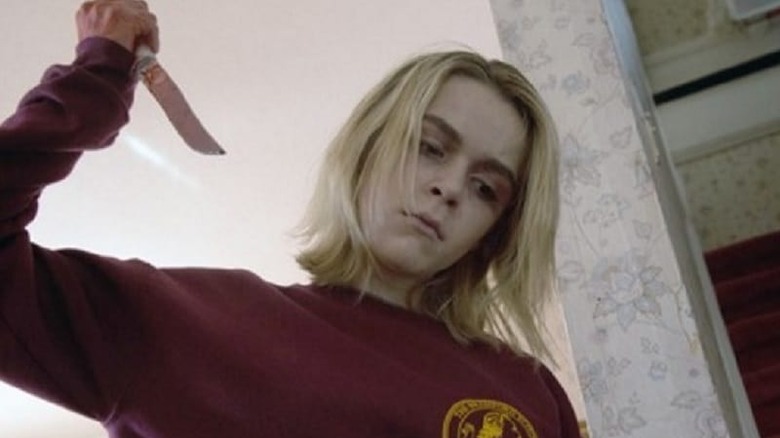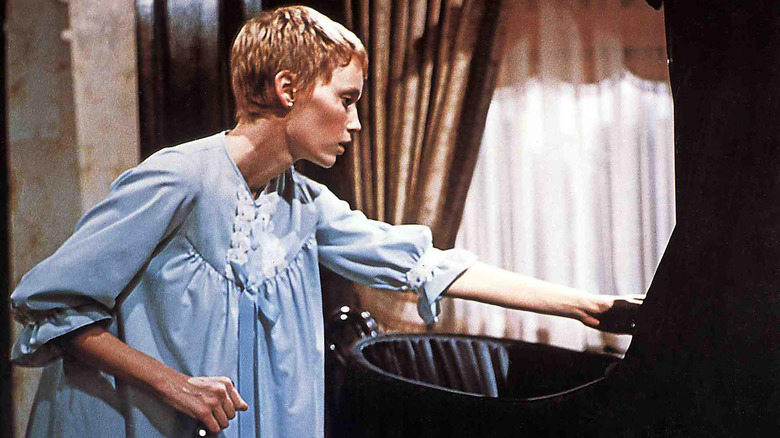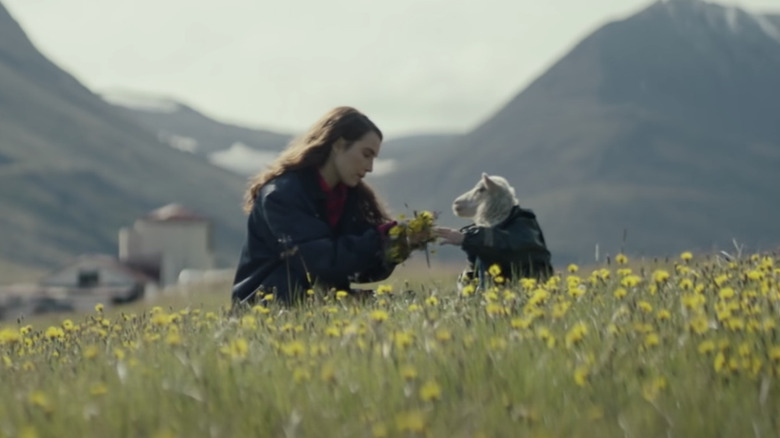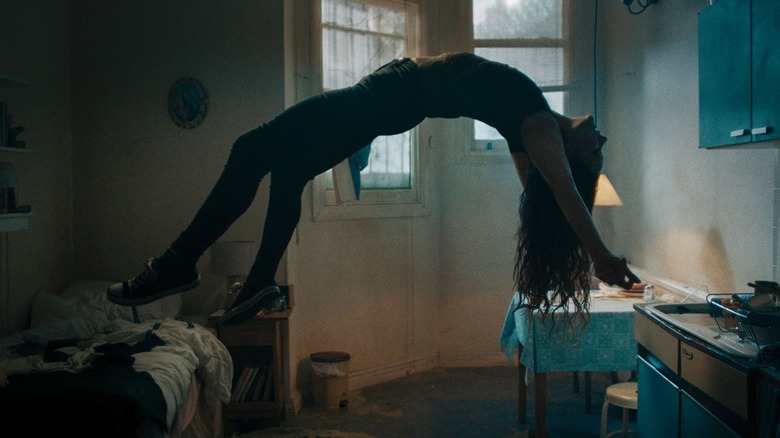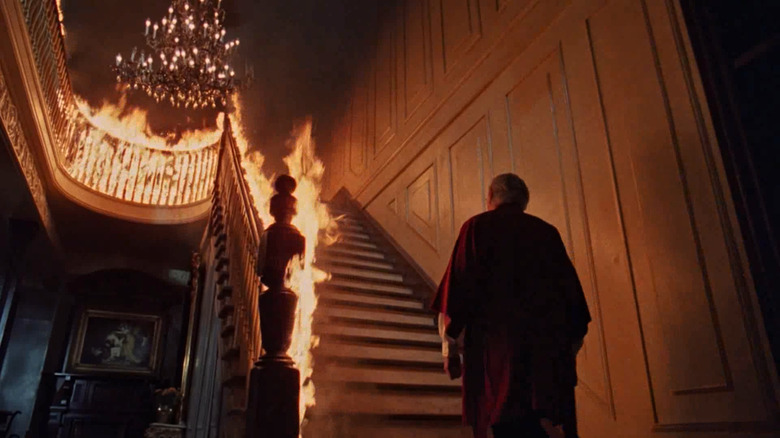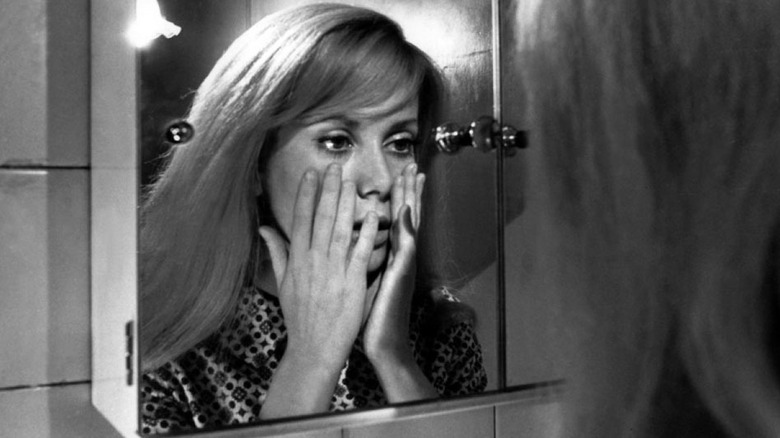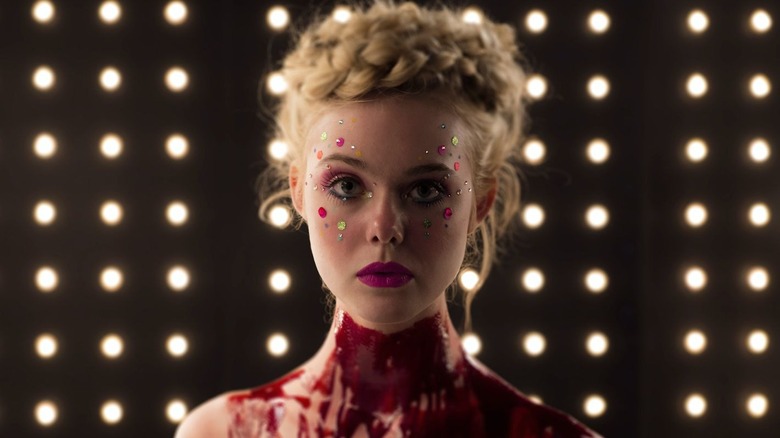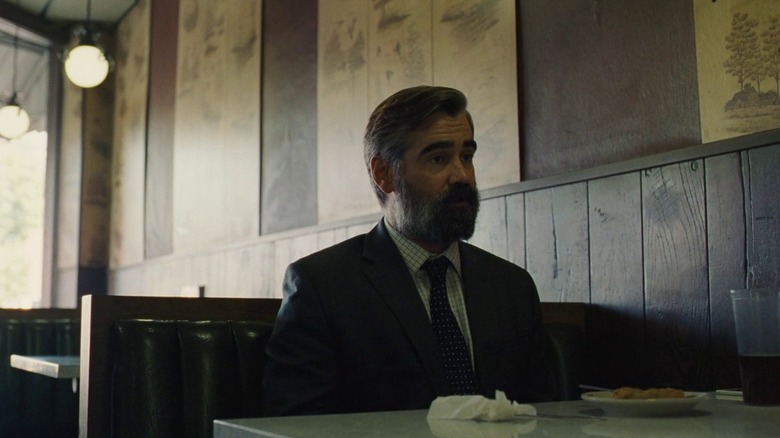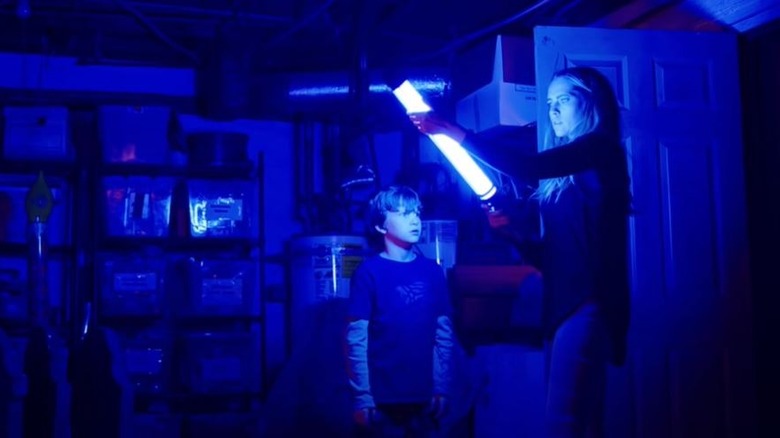Horror Movies Like The Exorcist That Will Truly Scare You
"The Exorcist" is undoubtedly one of the greatest horror films ever made. Based on the gripping novel by William Peter Blatty, William Friedkin's 1973 classic is one of the most chilling stories of demonic possession ever seen on screen. In an era of jump scares, Friedkin's slow approach feels even more unsettling. Friedkin was an untraditional choice to helm a horror film, and his background in dramatic filmmaking grounded the haunting story in reality.
"The Exorcist" follows the helpless mother Chris MacNeil (Ellen Burstyn) as she watches the declining mental and physical state of her 12-year-old daughter Regan (Linda Blair). Chris seeks spiritual guidance when traditional medication fails, and she employs Father Damien Karras (Jason Miller) to perform an exorcism. Karras is already struggling with his faith, but he and his companion Father Lankester Merrin (Max von Sydow) work together in their attempts to heal the child.
"The Exorcist" brought respect to the horror genre when many film critics were dismissive of it entirely. Earning ten Academy Award nominations and becoming the highest grossing film of the year, "The Exorcist" became a classic. Audiences were horrified by the film's graphic imagery, with some even growing physically ill. While the 1977 sequel "Exorcist II: The Heretic" was a notorious failure, the trilogy concluded on a strong note with Blatty's "The Exorcist III."
Horror fans will want to check out these movies similar to "The Exorcist" that are truly terrifying.
Hereditary
Modern horror films tend to feature melodrama and jump scares that bear a striking dissonance to Friedkin's methodical approach. Friedkin understood that true horror occurs on a personal level, and the film has its emotional impact from the realism with which the familial dynamics are depicted. Chris's sense of powerlessness watching her child slip away is devastating thanks to Burstyn's performance, which earned her an Academy Award nomination for Best Actress.
Ari Aster's terrifying directorial debut "Hereditary" immediately announced him as one of the foremost modern horror filmmakers, and a natural successor to Friedkin. "Hereditary" captures family tragedy with unflinching detail, and features similar themes of possession (although it doesn't feature Satan, rather focusing on the demon Paimon). The film introduces its characters through the Graham family's gathering for the funeral of their matriarch.
Annie (Toni Collette), her husband Steve (Gabriel Byrne), teenage son Peter (Alex Wolff), and disfigured daughter Charlie (Milly Shapiro) don't cope together, growing more isolated. Annie becomes fixated on recreating miniature buildings, and Peter grows distant and shuts out his sister. When Annie focuses the two to spend more time together, it results in an anxiety-inducing sequence in which an irresponsible Peter frantically drives Charlie home after she has an allergic reaction. Charlie's grisly death, Peter's silent disbelief, and Annie's faceless screams is one of the most perfectly executed scares of the 21st Century. Colette's stagnated healing is absolutely grueling on an emotional level, and she was truly snubbed of an Academy Award nomination.
The Conjuring
"The Conjuring" universe has been deepened and expanded, launching two sequels, the spinoff "Annabelle" series, and the standalone entries "The Nun" and "The Curse of La Llorona." The mythology has become dense and interconnected, and while it's exciting to see how the overall franchise moves forward, it's easy to forget how impactful James Wan's original film was. The 2013 supernatural horror film was disturbing in a way that horrified audiences, which is surprising given the film was rated PG-13. Wan himself had gained a following with the shocking violence in the "Saw" franchise, but "The Conjuring" was chilling based on its atmosphere and concepts alone.
Like "The Exorcist," "The Conjuring" takes place in a version of reality that viewers could identify with, as it was allegedly inspired by real events. The film follows paranormal investigators Ed (Patrick Wilson) and Lorraine Warren (Vera Farmiga) as they look for the origins of ghostly sightings in Rhode Island during the 1970s. The Warrens are recruited by the Perron family; Roger (Ron Livingston) and Carolyn (Lili Taylor) fear that their family home is haunted, and the mysterious death of their dog sparks an increasingly violent series of events.
Linda Blair's performance in "The Exorcist" is among the best child performances in horror film history, and "The Conjuring" has a great ensemble of young performers. The Warrens' children Andrea (Shanley Caswell), Nancy (Hayley McFarland), Christine (Joey King), Cindy (Mackenzie Foy), and April (Kyla Deaver) are brought to life by the talented young actresses.
The Witch
Religion is essential to the horror within "The Exorcist," as Blatty did extensive research into ensuring the film's accuracy to actual practices within the Catholic Church. Friedkin had little experience in horror, but he knew how to capture the details of a specific profession, and had earned significant acclaim for his depiction of police investigations and crime culture with "The French Connection." It's horrifying to see familiar religious imagery contorted under the influence of the demonic entity in "The Exorcist," particularly the controversial depiction of a crucifix. It's particularly devastating when a veteran priest like Father Merrin grows helpless to protect the MacNeils, as he's never experienced anything similar.
Robert Eggers's breathtaking 2016 debut "The Witch" is among the scariest Christian horror ever made. Few filmmakers announce themselves as icons based solely on the impact of their first work, but Eggers showed a mastery behind the camera that isn't found from those who've worked in the industry for decades. Eggers explored the religious anxieties within early Colonial culture, and details the journey of a Puritan family to New England in the 1630s. William (Ralph Ineson) and his wife Katherine (Kate Dickie) aim to raise their adolescent daughter Thomasin (Anya Taylor-Joy) and younger sons Caleb (Harvey Scrimshaw), Mercy (Ellie Grainger), and Jonas (Lucas Dawson) outside of the corrupting influence of a larger community. Like Friedkin, Eggers only gradually reveals the threat, and doesn't feature jump scares that stretch the story's believability.
The Blackcoat's Daughter
Horror films require a strong directorial voice, but they also benefit from a creative story structure that keeps the audience on their tones. "The Exorcist" felt so scary because it only subtly revealed the extent of the threat, teasing details about Karras's relationship to the Church that grant the film a sense of mystery. The story certainly goes in many unexpected directions, and audiences were unprepared for the tragic twist within the film's final moments.
Oz Perkins may have been best known as a comedic actor with bit parts "Legally Blonde" and "Not Another Teen Movie," but the son of Anthony Perkins — Norman Bates himself — knew horror well enough to craft a complex reimagining of the demonic subgenre. Perkin's directorial debut "The Blackcoat's Daughter" has a twisty narrative that is told in a nonlinear fashion, but the intricate timeline doesn't deplete the effectiveness of the scares. Like "The Exorcist," "The Blackcoat's Daughter" intertwines religion, sexuality, female empowerment, and emotional yearning within a contained environment.
The film follows three storylines of female students at the leading Catholic boarding school Bramford Academy in upstate New York who aren't picked up by their parents in the days prior to their holiday break. Katherine (Kiernan Shipka) is recovering from a recent familial tragedy, Rose (Lucy Boynton) is masking a pregnancy, and Joan (Emma Roberts) has recently escaped a mental asylum and is on the run. It's only in the film's final moments where the connection between the narratives is revealed.
Rosemary's Baby
Horror films are often left out of the awards conversation, and rarely receive major nominations from critical bodies like the Academy of Motion Picture Arts and Sciences. "Silence of the Lambs" is the only horror film to ever win Best Picture, but only a few have ever been nominated, including "Jaws," "The Sixth Sense," "Black Swan," and "Get Out." "The Exorcist" was among the first to cross that barrier, earning Best Picture recognition and Best Adapted Screenplay win for Blatty's brilliant work reinventing his iconic novel. The film was able to silence early doubters that the genre wasn't as "serious."
However, shortly before "The Exorcist" became a game changer, the 1968 horror film "Rosemary's Baby" set the precedent by becoming a critical favorite and awards contender. Also based on a novel (the 1967 smash hit by Ira Levin), "Rosemary's Baby" was wholly distinct from the monster movies and campier fare that were popular within the United States at the time. Roman Polanski's horrifying vision of the anxieties of parenthood became a renowned classic of paranoia and suspense, and laid the groundwork for Friedkin's achievement.
The film follows the couple Rosemary (Mia Farrow) and Guy Woodhouse (John Cassavetes) after they move into a new apartment in upstate New York. Rosemary becomes pregnant and suffers from debilitating nightmares, and suspects that her neighbors have sinister connections. Isolated and silenced, Rosemary begins to investigate the clues to the demonic possession on her own.
Lamb
"The Exorcist" is very much a mother's story. The reality of raising a child that Chris deals with gripped audiences because she didn't just act like a character in a film; Chris's heartbreaking search for answers as Regan's well-being declines represents the actual anxieties of a parent forced to raise her child. Horror films are often centered on female empowerment, but "The Exorcist" crafted a mold distinct from the "final girl" of a slasher flick.
2021's underrated supernatural horror film "Lamb" tackles similar themes, told with the same earnest emotional undercurrent that Friedkin mastered. Like "The Exorcist," "Lamb" is a piece of dramatic cinema that gradually introduces its fantasy elements. Valdimar Jóhannsson's film follows the lonely Icelandic couple Maria (Noomi Rapace) and Ingvar (Hilmir Snær Guðnason), who raise livestock on an isolated farm far away from the rest of civilization. They are mourning a series of losses, but Maria desperately wants to raise a child.
When she's unable to slay one of the lambs she's raised, Maria discovers the creature has given birth to an unusual hybrid baby that has human-like qualities. While they're initially shocked, Maria decides to raise the creature as her own child. The film explores themes of nature versus nurture; the lamb is brought up in an unusual home, and feels both the influences of Maria and Ingvars' loving care and the presence of a demonic tribe of lambs that lurk in the outskirts of the farm.
Saint Maud
"The Exorcist" does a terrific job exploring its priest characters and the overall religious hierarchy as it relates to the performance of the exorcism. Father Karras's crisis of faith is treated with respect, and Miller does a great job exploring the unique challenge in front of him; Karras is forced to offer solace and advice to Chris when he himself is struggling with his faith. He's reticent about speaking dishonestly, but also is empathetic to her pain and wants to cure Regan. Older priests can often be depicted as unsympathetic in films, but the experienced Father Levin is both a commanding and nurturing presence thanks to Sydow's gripping performance.
As the subgenre of Catholic demonic possession movies took off following the runaway success of the "The Exorcist," few have been as nuanced. However, A24's recent British horror film "Saint Maud" is similarly meticulous in its depiction of a younger caregiver. Rose Glass's directorial debut honored the legacy of "The Exorcist," a clear inspiration, but changed up the formula by offering a female perspective. The film follows the titular Maud (Morfydd Clark), a young nun within the Roman Catholic Church who is tasked with praying alongside patients who are dying.
Maud has a compelling backstory. She was once a nurse named Katie who failed to save a patient, and the traumatic experience motivates her to shed her former name and commit herself to the church. Maud is youthful, and her lack of experience makes the horror elements more frightening.
The Changeling
"The Exorcist" tells a unique horror story, as it is a film about healing. Instead of focusing on a villain so monstrous that it must be eliminated, Father Karras and Father Levin seek to save Regan's soul while combating her demonic torturer. "The Exorcist" tackles loss and the threat of impending death, as Chris is forced to consider what the intense pressure of the exorcism will have on her daughter. She fears what state Regan could return, and is forced to consider the unthinkable possibilities that either her soul will be compromised or she'll die in the process.
The 1980 Canadian horror classic "The Changeling" explores similar themes of guilt, loss, tragedy, and parental trauma. While it initially only garnered respectable reviews and box office returns, the film's legacy has grown in estimation as it gained a cult audience. Before he contributed to "The Exorcist" franchise with his excellent performance in "The Exorcist III," George C. Scott showed his aptitude for the horror genre with his role as the traumatized musician John Russell.
The film opens on a gripping note, as Russell watches his daughter and wife perish in a shocking car accident during a family winter vacation. Now living as an isolated composer in Seattle, Russell decides to take time to heal by renting a Victorian mansion. As he spends time in the property, Russell encounters frightening flashbacks to the mansion's past inhabitants, witnessing the cries of a dying child and the appearance of a demonic spirit.
Repulsion
One of the more frightening aspects of "The Exorcist" is the threat that the demon could reach Regan no matter where she stayed. The comfort of a home is shattered, and even the environment Chris maintains is disfigured with a sense of uneasiness. Instead of imagining horror as something otherworldly, Friedkin attacked domesticity itself. The incorporation of real locations from Georgetown benefits his realistic approach.
The 1965 horror classic "Repulsion" takes a similarly nuanced approach to its depiction of demonic sightings in a London apartment. It was the first horror film from Roman Polanski prior to his work on "Rosemary's Baby." The film follows the sisters Carol Ledoux (Catherine Deneuve) and Helen (Yvonne Furneaux) live very different lives. Helen is very affluent and sociable, often attending parties and engaging with friends. The younger Carol is much colder, nervous about interactions and unprepared for the advances of the leering Colin (John Fraser). Carol rejects his advances, but she's unable to seek her sister's solace and is left alone in their apartment after Helen departs to Italy on holiday. Carol is haunted by shocking nightmares amidst her isolation.
"Repulsion" does a great job depicting Carol's despair; similar to Chris in "The Exorcist," she feels as if she's exhausted all of her efforts and with no one to turn to for guidance. Deneuve's sensitive performance is just as gripping as Burstyn's. While "The Exorcist" explores motherhood, "Repulsion" tackles the restlessness of a single woman whose sexuality is repressed.
The Neon Demon
One of the more underrated aspects of "The Exorcist" is the attention paid to Chris's acting career. She is dealing with the realities of show business, and her life isn't a fairytale. Preparing for her upcoming roles takes a serious toll on Chris, who must shed her inherent nature to become a different character. Nicolas Winding Refn's divisive, yet brilliant, 2016 horror film "The Neon Demon" takes a similarly unglamorized depiction of Hollywood.
The film follows aspiring 16-year-old model Jesse (Elle Fanning) as she ventures from a small town to the City of Angels in order to follow her career aspirations. Jesse is timid, and she's frightened by the competitive environment and the threats she receives from other models. The film turns into a body horror once Jesse's quick success provokes jealousy among her rivals Gigi (Bella Heathcote) and Sarah (Abbey Lee), who reveal their cannibalistic impulses.
The Killing of a Sacred Deer
"The Exorcist" remarkably maintains the intensity throughout its runtime. Friedkin doesn't give audiences a moment to breathe amidst Regan's frequent outbursts and reactions to the demon. Sustaining that perpetual dread is something few modern filmmakers can capture, but Greek filmmaker Yorgos Lanthimos brings a similarly demented realism to his idiosyncratic stories. His 2016 film "The Killing of a Sacred Deer" is one of the most tense, nail biting horror films in recent memory.
The film follows surgeon Steven Murphy (Colin Farrell), who decides to invite the teenage boy Martin (Barry Keoghan) to his family home as he deals with the recent death of his father. Steven's wife Anna (Nicole Kidman) takes care of the grieving boy. Martin develops a romantic interest in the Murphys' teenage daughter Kim (Raffey Cassidy), and he steadily begins to infect their family dynamic with sinister intentions. Keoghan's off-putting bluntness heightens the suspense as Martin's behavior grows more violent; his idiosyncratic cadence early on foreshadows the dark direction that the character heads in as his obsessions grow.
Lights Out
Many demonic possession films followed "The Exorcist," but often they focused more on the mythology of the Satanic creatures than the emotional impact it has on the characters. Director David F. Sandberg took an approach similar to Friedkin's with his 2016 supernatural horror film "Lights Out." Sandberg was more interested in developing a compelling family dynamic than wasting time on exposition, and the film is more engaging as a result. Even Sandberg's jump scares are artfully handled.
The film follows the young woman Rebecca (Teresa Palmer), who must take care of her depressed younger brother Martin (Gabriel Bateman). Martin is obsessed with their mother and has developed antisocial behavior, and Rebecca learns that their deceased mother had a secret connection to an imaginary friend. As Rebecca begins researching their family history, they are visited by a shadowy figure who only appears in pitch darkness. Palmer's performance is devastating; she's forced into a maternal role she doesn't feel prepared for, and saddled with shocking family secrets that shake her identity.
